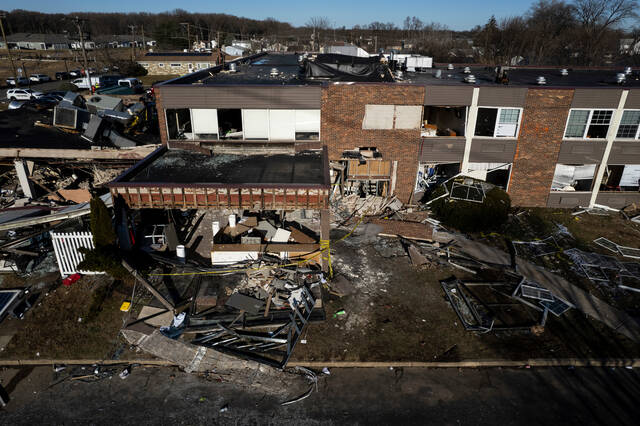The Pennsylvania Senate race is headed to a recount.
Republican businessman Dave McCormick led by about 24,000 votes over Democratic incumbent Bob Casey as of Thursday afternoon. McCormick has secured 48.9% to Casey’s 48.5%.
The Associated Press and Decision Desk have called the race for McCormick.
But because the race is within 0.5 percentage point and the candidate trailing, Casey, hasn’t conceded or didn’t officially object to a recount, the state is required to order a recount.
All 67 Pennsylvania counties will recount their ballots.
Over 7 million votes will be retabulated.
Once counties finish counting their ballots, they must begin the recount no later than Nov. 20 and complete it by noon Nov. 26.
Here are five things to know about Pennsylvania recounts.
How will votes be recounted?
All 67 counties must utilize two methods to recount their ballots: manually (by hand), or using different tabulation machines than used during the initial count.
Pennsylvania Secretary of the Commonwealth Al Schmidt, who is in charge of administering the state’s elections, said Thursday recounting this way is done to “ensure any potential tabulation issues can be identified.”
Allegheny County will recount its ballots by switching tabulation machines it used to count in-person ballots and mail-in ballots, said county spokeswoman Abigail Gardner.
Gardner said county employees will run the county’s more than 227,000 mail-in ballots through the machines that normally tabulate in-person votes, and the more than 486,000 in-person ballots through the machine that counts the mail-in ballots.
She estimates the recount process will take several days, and election workers will start Wednesday. Allegheny County’s recount will take place in the county’s election warehouse.
Westmoreland County Election Director Greg McCloskey said the county will also switch machines to tabulate votes in a recount.
McCloskey said he expects to start the recount Wednesday.
Kevin Greenberg is a Philadelphia political law lawyer at the Greenberg Traurig firm. He regularly counsels people in Pennsylvania races, but is not involved in any races this year.
Greenberg said most larger counties will switch tabulation machines to conduct recount, but smaller counties might hand-count ballots.
That is usually only the case when counties have around 1,000 ballots to count.
Have recounts changed outcomes?
Schmidt says this year’s recount will be the eighth triggered in Pennsylvania in the last 20 years.
Of the seven previous recounts that have been legally triggered and completed, three were waived by the losing candidates.
In the four that weren’t conceded, the recount did not change the outcome and confirmed the candidate that was ahead before the recount, Schmidt said.
Greenberg said this is typical. He noted there are a decent amount of votes that change, but the changes tend to wash each other out and not move in one direction.
“You might have 20,000 votes that change, but it is very likely the net margin will be very small, like 9,998 votes for one candidate and 10,002 for the other,” he said.
Greenberg said computer technology and transferring data from counties to the state electronically has helped in ensuring recounts don’t change the results much.
“In the history of recount, it would be truly exceptional for a 1,000 vote change to happen,” he said. “The kind of sloppy human errors aren’t really possible now with modern technology.”
The most recent was in 2022, between McCormick and television personality Mehmet Oz in the Republican primary for U.S. Senate.
In that race, Oz beat McCormick by a margin of 0.07% — just 902 votes — triggering the recount. McCormick conceded before the recount was complete. That recount shifted the margin by 49 votes in Oz’s favor.
How much will it cost?
The Department of State estimates the recount will cost taxpayers more than $1 million, which is in line with the costs of recounts that occurred in 2022 and 2021.
The Oz-McCormick recount cost $1,052,609.
A 2021 general election recount in a Commonwealth Court contest cost $1,117,180.
Recounts more than 10 years ago were considerably cheaper. In a 2011 Democratic primary recount for Commonwealth Court, the state spent just over $525,000.
A 2009 general election recount in a Superior Court race cost $541,698.
Can the recount be stopped?
Pennsylvania recounts can be stopped, but only if the losing candidate calls it off, Greenberg said.
Some Republicans in the state, like state Senate President Pro Tempore Kim Ward, R-Hempfield, pressured Gov. Josh Shapiro on Thursday to stop the recount.
But Greenberg said the recount is ordered by state law and is not under the discretion of the governor.
Casey, the trailing candidate, had the opportunity to concede and reject the recount, but he declined.
Greenberg said there is a little wiggle room, and the state has stopped recounts when losing candidates have called off the recount after that deadline.
Legal challenges loom large
Counties across the state are still counting ballots even as a recount order has been issued.
Schmidt said Wednesday there were about 80,000 votes left to count, but that amount has shrunk as several thousands ballots were counted Thursday.
Some of those remaining ballots are being contested in court.
Republicans on Thursday asked courts not to allow counties to count mail-in ballots where the voter didn’t write a date on the return envelope or wrote an incorrect date.
Democrats, meanwhile, want these ballots counted.
This issue, combined with the recount, could impact the outcome of the Senate race, Greenberg said, but there is too much uncertainty over how many ballots will get approved and which way they will swing.
“After that is done, it is possible that litigation and recount will move the needle, but we don’t know yet how many votes are implicated and whether that will be material to the count,” he said.
Overall, Greenberg said patience is the key for anxious campaigns and voters. He said every other race in Pennsylvania has been decided this year, so a bit more time for the Senate race shouldn’t hurt.
“One race out of those 300 remains uncalled, and if it takes two extra weeks to get the accurate count, I am glad we are counting every vote,” he said.








